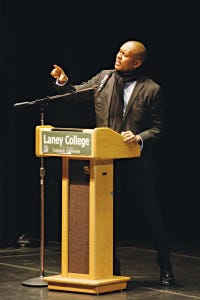
Kevin Powell, author of eight books, gave the keynote address at Flex day activities on Jan. 14 at the Laney Theatre. He delivered an impassioned speech to a large, enthusiastic audience of faculty, staff and students.
Powell frequently referenced his own educational challenges that included graduating from high school in a school district with low expectations for academic performance, particularly by students of color.
When addressing his complex topic, “Equity in America: A Discussion of Educational Life Opportunities and Possibilities for all Students,” he provided several practical and theoretical examples to illustrate his themes while also frequently citing key historical events for context.
He started with the issue of cultural context, noting that black, brown and/or Asia names largely went missing from any historical discourse about the United States in his school textbooks. “How can you possibly know who you are if your entire community has been excluded from the textbooks?
“I had to get all the way to college before learning about African-American contributions not just to the building of America, but also as the cradle of human civilization, pre-dating the Greek culture. How could all of those achievements and contributions have been overlooked?”
Several audience members nodded in agreement with this observation. Powell went on to talk about the critical importance of student recognition, encouragement, inclusion, and acceptance as tools for effective teaching. And the need to raise expectations for students of color so that they will perform and achieve at higher levels.
Given the make-up of the audience and demographics of PCCD’s student body, Powell’s examples of racism and classism, intended or not, resonated. But he deftly shifted gears to focus on the future, and recommended actions to remedy institutional racism. “Specifically, how can we, as educators, reshape the learning environment of our community colleges so that everyone is welcomed and supported?”
He posed personal questions and challenges to faculty in attendance. Powell’s formula for effective teaching is firmly rooted in teachers who have the capacity to love and nurture young people. “Do you truly respect your students? If your honest answer is no, it is time to retire.”
He urged faculty to discard teaching techniques from the 70s, 80s and 90s, and embrace youth culture. “Hip hop and social media are dominant features of youth culture worldwide. Accept that these are the new currencies of the communication realm — embrace them.”
Powell believes that “as educators, our job is to create leaders. That starts with understanding and acceptance. When we root our love in cooperation, understanding, and healing, there is
nothing our students cannot accomplish.”
(To view Powell’s speech, go to: http:// bit.ly/18x1CK7)

























